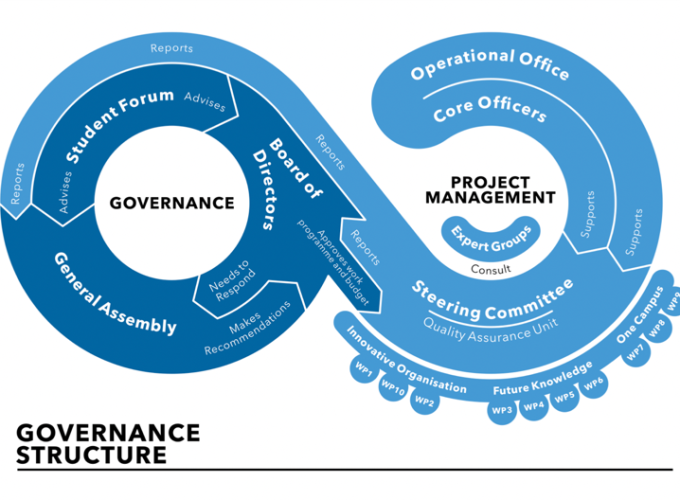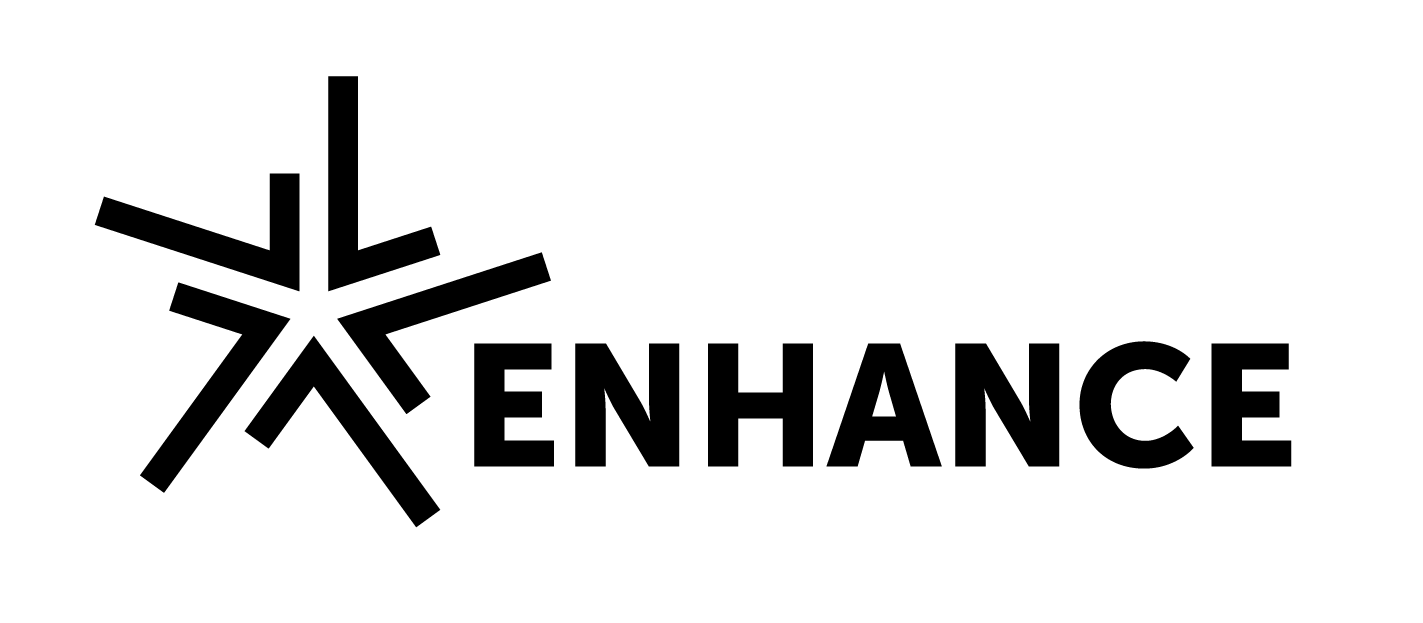By Ana-Marija Cvitic, Strategy Officer ENHANCE Alliance
A well-functioning governance is key to the efficient achievement of a university’s mission. The question is all the more important when steering a university alliance such as ENHANCE, consisting of several higher education institutions.
The Erasmus+ call, under which the ENHANCE Alliance started its operations in 2020, highlights long-term goals such as the formation of European knowledge-creating teams to address social challenges or the establishment of a joint European higher education inter-university campus with seamless student and staff mobility as well as joint flexible curricula.
In addition, “European Universities should progressively build their capacity to act as models of good practice to further increase the quality, international competitiveness and attractiveness of the European higher education landscape and should become key elements of the European Education Area by driving excellence”, the European Commission states in the Erasmus+ guidelines.
Member institutions of the ENHANCE Alliance are therefore invited to go beyond existing higher education cooperation models and test different innovative and structural models for implementing and achieving this ambitious long-term vision of a European University. Alliances are asked to develop a governance model that includes the diverse university community and leads to processes that support democratic decision-making and sustainable management.
In every transnational project it’s well known that Europe hosts a significant diversity of framework conditions, regulations, decision-making and implementation processes that govern the way in which higher education institutions operate. The ENHANCE Alliance is formed by members with diverse legal statutes, including public and private institutions or foundations. The member institutions have furthermore made different choices regarding their strategic focus. These are factors that can prove challenging when creating a common governance structure.
However, the governance model of ENHANCE tries to convert these differences into strengths focusing on innovation, inclusive and sustainable collaboration, and pooled resources.
The core purpose of our governance structure is to enable deeper systemic, structural, and sustainable transformation of our members to facilitate greater cooperation. These are our guiding principles of ensuring participatory governance:
- Integration: we focus on collaboration amongst our partners to enable efficient co-creation and to ensure the pooling of resources within the Alliance.
- Efficiency: We map and align our partners’ interests to ensure the European added value created by ENHANCE is accessible to all partners, based on democratic principles.
- Agility: we maintain a flexible and proactive management that allows for rapid negotiations, decision-making and conflict resolution, as well as the successful navigation of today’s fast-paced society.
Our governance structure is supported by the design of shared management structures, such as joint boards, a shared pool of physical and virtual intellectual and administrative resources, shared resources, joint provision of infrastructure, data, and services such as student, researcher and staff support, administration and international relations, and joint digitalised processes where possible.
In total we establish four key governance bodies to ensure the involvement and representation of all statutory groups and equal representation of all ENHANCE partners.
1) ENHANCE Steering Committee (SteerCo)
The ENHANCE Steering Committee is the senior body responsible for the overall strategic direction of the Alliance and with designated decision-making responsibilities. Its core operational role includes the approval of high-priority or high-risk deliverables, advising Work Packages on activity development or implementation challenges, and approval of budget decisions up to a certain threshold. The SteerCo considers strategic topics of relevance for the Alliance, and shapes our long-term strategy, drafting documents to be approved by the Board of Directors. The SteerCo also supports the development of internal structures at our member institutions to foster the creation of alliance-friendly ecosystems. In order to facilitate this joint operational and strategic function, the SteerCo meets four times a year, including one in-person meeting. Additional meetings may be proposed by the Chair and scheduled if needed to address urgent issues outside of the regular meeting cycle.
2) ENHANCE General Assembly (GA)
The General Assembly represents the cross-cut of our university communities and is the forum where positions on key strategic points are collectively developed, supporting a participatory process whereby all relevant stakeholders can contribute their perspective to the development of ENHANCE activities. The GA helps anchor the ENHANCE project in our member universities, spreading interest and ownership through all statutory groups. In addition, the GA formulates positions on relevant policy developments. The GA meets two times a year, including in-person meetings every two years. Subgroups may meet additionally, to review strategy papers or where the perspective of a particular statutory group is needed e.g., in the development of an education offer. The GA is made up of one representative per statutory group per member institution. The four statutory groups are 1) students, 2) PhD students, 3) professors, 4) administrative staff. In addition, Associated Partners participate in the GA with one representative per AP, without voting rights.
3) ENHANCE Student Forum (SF)
The Student Forum is ENHANCE’s student network which represents the student bodies of each member university and collectively represents the student perspective in the Alliance. The SF offers feedback on activities and pilots, and may formulate recommendations for consideration by the BoD. In addition, the SF represents ENHANCE in the European student networks and contributes to debate at this level. The SF meets regularly virtually and once annually holds a European in-person meeting. Each member university is represented in the SF by two student representatives, nominated and elected at the individual member universities.
4) ENHANCE Board of Directors (BoD)
The ENHANCE Board of Directors is the senior executive governance body of the Alliance and has decision-making responsibility for approval of the strategic direction of the Alliance (including new project proposals or significant amendments to ongoing projects), budget decisions over a certain threshold, and any amendments to the Consortium or its key governance documents. The BoD meets twice annually, with one meeting in-person. Membership: Each partner is represented by their university rector or equivalent. In addition, the two SF Chairs and the GA Chair are members of the BoD. To support communication between the BoD and SteerCo, the SteerCo Chair is an ex officio member of the BoD. The Chair of the BoD is elected for a two-year term.

The governance structure is an important measure to facilitate the crucial involvement of our student communities in ENHANCE activities. The Student Forum is represented in the senior executive governance body (ENHANCE Board of Directors) by its two Co-Chairs, who bring recommendations or points for discussion to the agenda. This ensures the voice of ENHANCE students is represented at the highest level of our governance structure and provides a formalised route for feedback on project development, as well as for students to propose new ideas to the ENHANCE leadership.
Students also make-up one quarter of the ENHANCE General Assembly where they are invited to provide recommendations at the development stage of activities, or offer feedback on pilots at the implementation stage, and bring this into GA discussions where ENHANCE-wide policy positions and strategic approaches will be explored. The high involvement of students in our joint structures gives them a pivotal role in the co-creation of the Alliance and supports the development of student-centred teaching and learning.
Because of this dense network of governance-stakeholders, ENHANCE acts as a close community of partners, guided by a shared vision and mutual trust. This balance between trusted cooperation and clear decision-making and conflict resolution measures is essential to the realisation of our mission – allowing us to pursue true co-creation and still deliver a successful and ambitious transnational project of this complexity.



